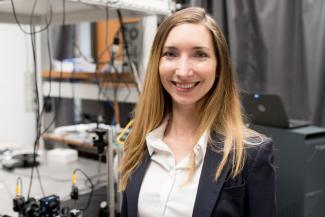
Prof. Jean Anne Incorvia of Texas ECE has been named a 2021 Intel® Rising Star. The Rising Star Faculty Award is an invitation-only program to foster innovation and help promote the careers of promising early-career faculty members. This year Intel recognized "10 promising early-career academic researchers who are leading some of the most important technology research of our time."
The program recognizes members of the community who are doing exceptional work in the field and facilitates long-term collaborative relationships with senior technical leaders at Intel. In addition, Intel selected researchers who are involved in innovative methods of teaching and increasing the participation of women and underrepresented minorities in computer science and engineering. The chosen faculty members work with disruptive technologies that have the potential to advance the future of computing, such as computer science, electrical engineering, computer engineering, material science, and chemical engineering.
The key technology areas under investigation by selected faculty include cybersecurity, hardware security, nanotechnology, semiconductor device technologies, neuromorphic computing, machine learning/artificial intelligence, and memory management.
The award recognizes Prof. Incorvia as "an expert in nanoelectronics and has significantly advanced magnetic-material-based devices for computation. Her Ph.D. at Harvard and MIT, and postdoctoral work at Stanford established her as one of, if not the, top experts in magnetic tunnel junction-based computation. Jean Anne’s research focus areas include memory and architecture. At UT Austin, Professor Incorvia has extended this work to include memory such as novel magnetic random-access memory (MRAM) and in-memory computing as well as neuromorphic computing, artificial intelligence, and machine learning. Her research focuses on the design, fabrication, and testing of in-memory and neuromorphic computing devices and circuits using emerging materials."
Prof. Jean Anne Incorvia is an assistant professor and Fellow of Advanced Micro Devices (AMD) Chair in Computer Engineering in The Department of Electrical and Computer Engineering at The University of Texas at Austin where she directs the Integrated Nano Computing (INC) Lab.
She has over 45 articles published or under-review in peer-reviewed journals and conference proceedings, has led 2 patents, and has given over 30 invited talks. She received the 2020 US National Science Foundation CAREER award and the 2020 IEEE Magnetics Society Early Career Award, both highly competitive awards in her field. She was an invited contributor to the 2020 IEEE International Roadmap for Devices and Systems (IDRS), the main document to predict the future of electronics. She is leading a multi-PI collaboration with Sandia National Laboratories and has received funding from 6 National Science Foundation and 2 Department of Energy grants as of 2020. She is serving on the administrative committee of the IEEE Magnetics Society, as well as having served on multiple conference committees, including the International Electron Devices Meeting (IEDM), the Device Research Conference (DRC), the Magnetism and Magnetic Materials Conference (MMM), and Intermag.
